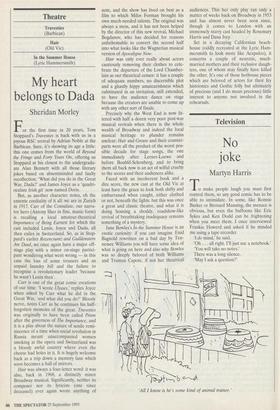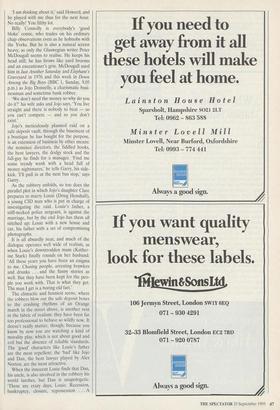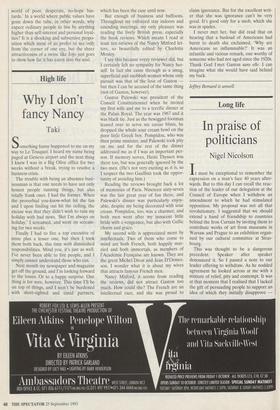Television
No joke
Martyn Harris
To make people laugh you must first control them, so any good comic has to be able to intimidate. In some, like Ronnie Barker or Bernard Manning, the menace is obvious, but even the buffoons like Eric Sykes and Ken Dodd can be frightening when you meet them. I once interviewed Frankie Howerd and asked if he minded me using a tape recorder.
'I do mind,' he said.
'Oh. . . all right. I'll just use a notebook.' 'You will take no notes.'
There was a long silence.
'May I ask a question?'
'I am thinking about it,' said Howerd, and he played with me thus for the next hour. No really! You filthy lot.
Billy Connolly is everybody's 'good bloke' comic, who trades on his ordinary chap observations even as he hobnobs with the Yorks. But he is also a natural screen heavy, as only the Glaswegian writer Peter McDougall seems to realise. He keeps his head still; he has brows like yard brooms and an executioner's grin. McDougall used
him in Just Another Saturday and Elephant's Graveyard in 1976 and this week in Down Among the Big Boys (BBC 1, Sunday, 9.05 p.m.) as Jojo Donnelly, a charismatic busi- nessman and sometime bank robber.
`We don't need the money so why do you do it?' his wife asks and Jojo says, 'You live straight and there is nobody to beat — so you can't compete — and so you don't exist.'
Jojo's meticulously planned raid on a safe deposit vault, through the basement of a boutique he has bought for the purpose, is an extension of business by other means: the nominee directors, the fiddled books, the bent lawyers, the dodgy stock and the fall-guy he finds for a manager. 'Find me some trendy wank with a head full of money nightmares,' he tells Garry, his side- kick. 'I'll pull in at the next bus stop,' says Garry.
As the robbery unfolds, so too does the parallel plot in which Jojo's daughter Clare prepares to marry Louie (Doug Henshall), a young CID man who is put in charge of investigating the raid. Louie's father, a stiff-necked police sergeant, is against the marriage, but by the end Jojo has them all stitched up: Louie with a new house and car, his father with a set of compromising photographs.
It is all absurdly neat, and much of the dialogue operates well wide of realism, as when Louie's downtrodden mum (Kather- ine Stark) finally rounds on her husband: 'All these years you have been an enigma
to me. Chasing people, arresting brawlers and drunks . . . and the funny stories as well. But they have been kept for the peo- ple you work with. That is what they get. The man I get is a boring old fart.'
The climactic and funniest scene, where the robbers blow out the safe deposit boxes to the crashing rhythms of an Orange march in the street above, is another rent in the fabric of realism: they have been far too professional to behave so wildly now. It doesn't really matter, though, because you know by now you are watching a kind of morality play, which is not about good and evil but the absence of reliable standards. The 'good' characters like Louie's father are the most repellent; the 'bad' like Jojo and Dan, the bent lawyer played by Alex Norton, are the most attractive.
When the innocent Louie finds that Dan, his uncle, is also involved in the robbery his world lurches, but Dan is unapologetic. 'These are crazy days, Louie. Recession, bankruptcy, closure, repossession ... A world of poor, desperate, no-hope bas- tards.' In a world where public values have gone down the tube, in other words, why expect ordinary people to live by anything higher than self-interest and personal loyal- ties? It is a shocking and subversive propo- sition which most of us prefer to see only from' the corner of one eye, but the sheer attractiveness of a swine like Jojo just goes to show how far it has eaten into the soul.




























































 Previous page
Previous page